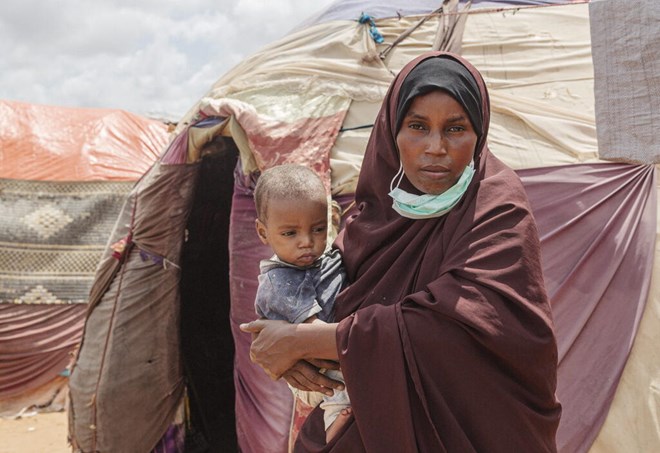
Wednesday December 23, 2020

“It was dry, very dry. There was no water, nothing to eat.”
Amina, age 24, is a mother of five living in a camp for displaced families in Mogadishu, Somalia. Having made her living working on farms, she had to flee her home in the town of Buurhakaba after a drought destroyed her livelihood and ability to feed her family.
Video
A Somali mother’s journey to access lifesaving care for her son
Life in the camp is not easy. There is not always enough to eat there either—and her son has suffered from malnutrition. Malnutrition is not just hunger; it’s a life-threatening condition that can rob children of the opportunity to live full and healthy lives.
When her son was sick, Amina turned to an International Rescue Committee clinic for help. Explore photos of the clinic to go inside the IRC’s work and meet Amina and other mothers determined to raise healthy children in the face of daunting odds.Somalia has spent decades in the grip of violent conflict. Today, it also faces the largest desert locust invasion in decades, a growing hunger crisis and, of course, the COVID-19 pandemic. Climate change threatens to make life even more difficult in a country already prone to natural disasters.
“We used to cultivate farms,” Amina told the IRC. “When the farms became dry there was nothing to do, so I fled.”
Despite these challenges, staff at the IRC clinic in Mogadishu continue to provide essential services, including treatment for acute malnutrition. The clinic uses the IRC’s innovative “combined-protocol” approach. By combining treatment for moderate and severe acute malnutrition under one program and bringing help directly to where families live, the approach is designed to dramatically increase the number of children reached. Currently, 80 percent of the 50 million children around the world suffering from malnutrition each year do not have access to treatment.
Of course, COVID-19 complicates this work. To ensure services are provided safely, patients wash their hands and have their temperature taken at the entrance of the clinic. Masks are required.
“Once the patients get inside, they see all staff covering their mouth and wearing gloves,” says Hafsa, a nurse at the clinic. “This shows the patient that the disease really exists and that they are not the only ones wearing these things and they accept it.”
Recovery and hope for the future
In the clinic, children are assessed to determine a diagnosis. The IRC has been championing simple and intuitive tools that community health workers can use to diagnose even children who can’t make it to a clinic. One example is a color-coded armband that anyone can use to measure upper-arm circumference for signs of malnutrition.
Once diagnosed, a key treatment for malnutrition is Plumpy’Nut, a vitamin-packed, protein-rich paste that does not require preparation or medical supervision.
Recognizing that malnourished children’s families are likely facing many challenges, the clinic in Mogadishu offers more than just health care.
“When we came here, they helped us a lot,” Amina said. “They gave us Plumpy’Nut. I met with a young lady who works here and she guided me and taught me how to give my children nutritious food. They gave us money, food, milk and clothes and so many other things that were really very useful and important to us.”
These needs are compounded by COVID-19. Amina, for instance, has again lost her livelihood. She had been washing clothes for a living but during the pandemic few people want to pay her to do their laundry.
While her challenges are not over, Amina was grateful for the IRC staff members’ continued interest in her son’s care, pointing out that one nutrition nurse called her on a daily basis to inquire about her son’s progress.
“I was really thrilled when my child got better,” she said.
*Last names have been omitted to protect the story subjects’ privacy.
How the IRC helps in Somalia
The IRC first began assisting Somalis in 1981. Today, the organization supports Somalis’ economic well-being through job training, food vouchers and direct cash assistance to farmers, shepherds and small business owners.
The IRC also supports village savings and loan groups and job-training programs that help women meet their families’ needs and increase their decision-making power. In addition to our work combating malnutrition, we also help prevent and address health crises by building and rehabilitating water systems and other critical infrastructure, providing primary health care services via both static and mobile clinics to underserved people, and training health workers.